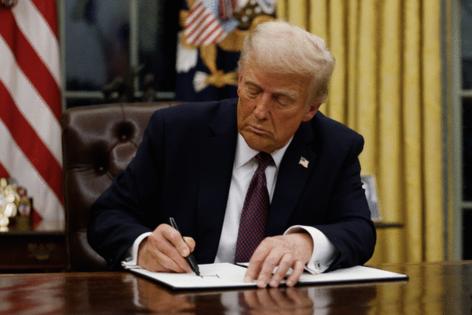Commentary: Even without the acronym, diverse workforces thrive
Published in Op Eds
The good of diversity must not be jettisoned from the workplace or eliminated from core American values in one sweeping move.
The recent executive order eliminates initiatives “including illegal DEI and ‘diversity, equity, inclusion, and accessibility’ (DEIA) mandates, policies, programs, preferences, and activities in the Federal Government, under whatever name they appear.”
Following this declaration concerning diversity, it is crucial to remember the overwhelming good diversity actually does in the workplace. Diversity is not about checking a box. It is a vital tool for businesses, leaders, employees, and owners of public and private enterprises, as well as the global economy, to maximize profits and growth.
Any rhetorical war on these acronyms risks compromising strong commercial endeavors. Losing and replacing the workforce is hard; ensuring talent retention is necessary for innovation and profitability. Employees want to be a part of a meritocratic, dynamic, and inclusive workplace. Great leaders do not want to exist in an echo chamber.
The majority of people in this country agree. A Pew Research Center Study from 2023 reports that 56 percent of employed U.S. adults report “focusing on increasing” diversity “at work is a good thing.”
The case for diversity as a business asset is demonstrated in McKinsey & Co.’s frequently quoted report, Diversity Matters, with 2023 survey results from 1,265 companies in 23 countries across six global regions. The report shows companies in the “top quartile for both gender and ethnic diversity in executive teams are on average nine percent more likely to outperform their peers.”
Additionally, “Companies in the top quartile for board-gender diversity are 27% more likely to outperform financially than those in the bottom quartile. Similarly, companies in the top quartile for ethnically diverse boards are 13% more likely to outperform than those in the bottom quartile.” According to another McKinsey study, businesses that have a more diverse workforce have a 35% performance advantage over workforces that do not encourage diversity.
Innovation increases with diverse management teams, as research shows those teams deliver 19% higher revenues from new products compared to teams that are less diverse.
Most employees embrace diversity and consider it a factor in retention. The 2024 Edelman Trust Barometer, examining attitudes on diversity, equity, and inclusion in the workplace, found that 81-85% of employees across race and ethnic identities say their employer investing in these programs increases employee loyalty in the long term.
The mandate is that “federal agencies are directed to promote in the private sector the policy of individual initiative, excellence, and hard work.” Indeed, initiative, excellence, and hard work are universal goals and are not undermined by a diverse workforce but rather are enhanced. Exceptional employees can come from any background.
The latest 2025 hiring trends show “that diverse workplaces foster innovation and attract top candidates," with 78% of the workforce stating that (diversity) is important to them. Companies that deprioritize diversity “risk losing out on both talent and long-term organizational success.”
A Glassdoor/Harris Poll reports that 32% of employees say they would not even apply for a job at a company that demonstrates a lack of diversity.
Hiring and retention are difficult in this economic environment – and expensive — with the 2024 Training Industry Report stating U.S. training expenditures totaled $98 billion in 2024. The stance on acronyms only compromises the strong commercial directive of talent acquisition. There is always an ongoing war to attract and retain the best talent, which American companies want to win.
Human resources experts recognize that to hire the best candidates, it is necessary to cast as wide a net as possible. Employers and leaders aim to attract the best talent across career stages with the widest range of backgrounds and experiences in order to produce and distribute the greatest range of products and services.
My family immigrated to the U.S. from India after I spent my childhood in the United Kingdom and Dubai. After graduating from The Wharton School at the University of Pennsylvania, I worked in financial services at Goldman Sachs for 10 years until I launched a financial technology company in 2017.
Today, as CEO of Ellevate Network, a professional network that now includes over 200,000 members globally across 31 cities, I lead a team that has worked with companies and their leaders for three decades to increase the diversity of their teams and improve their bottom line. The data speaks for itself.
There is something very specific, magical –and measurable—that happens when humans interact with each other without bias and discrimination. When you are in a work and networking environment where the best of the best convene, you will be challenged intellectually and creatively. If you want a competitive edge, you need to have access to as many different points of view as possible.
Saying no to diversity is saying no to success.
____
Anusha Harid-Paoletti is the CEO of Ellevate Network.
_____
©2025 The Fulcrum. Visit at thefulcrum.us. Distributed by Tribune Content Agency, LLC.




























































Comments